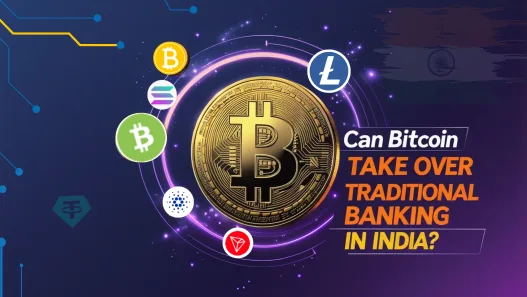
Cryptocurrency, or the digital mode of money, is gaining traction, as this is a hassle-free transaction and holds back the original value and suffers no fluctuation. Trading cryptocurrency and other bitcoins in India faces a 30% tax, which is quite high. There are many trading platforms in India that allows Bitcoin trading, but still, it’s not a fully recognized system. Cryptocurrency trading in India is still not gaining roots, and the reasons behind are enumerated below:
- Limited Adoption: Bitcoin has limited adoption, and there are various factors responsible for it.
- Regulatory uncertainty: Bitcoins are not uniformly regulated in various countries, leading to confusion among users and businesses. Lack of clarity makes it difficult for the business to operate and also individuals feel difficulty in understanding legal implications.
- Technological complexity: Blockchain technology and cryptography might be difficult for individuals to understand.
- Price volatility: There is fluctuations in cryptocurrency, thereby making it difficult for business and a medium of exchange.
- Security concerns: Cryptocurrency wallets have been targeted by hackers, thereby making it difficult for users.
- Lack of trusted awareness: There is a lack of awareness among users of cryptocurrency usage.
- Social & psychological factors: Social influence and perceived risk play a great role in adopting Bitcoin.
- Security risks: Bitcoin’s primary peril is mainly from its dependency on technology and blockchain. Although it’s considered secure, there are still certain vulnerabilities that exist in online exchanges and wallets. They store large amounts of funds and data, thereby making it vulnerable to theft. Digital wallets could be prone to theft and phishing. Although hardware security wallet is considered secure, they could still be lost or damaged anytime.
- Lack of reversibility & user error: The process of Bitcoin trade is an irreversible process. There is no way to recover the funds once it’s lost. Once you forget the private keys to a cryptocurrency account, that can lead to a permanent loss. Once a Bitcoin amount is remitted to a permanent address, it cannot be retrieved.
- Price volatility: Bitcoin value is considered speculative and can fluctuate, thereby making it riskier. The price of Bitcoin could be influenced by investors and manipulators. This leads to losses for small investors.
- Others: As Quantum computing makes a route, it poses a threat to cryptographic algorithms. If individuals have information about cryptocurrency, then t steal or sabotage Bitcoin. There are several scams and fraudulent activities. These can lead to significant losses for any unsuspecting investors.
- Financial stability: Bitcoin’s price and stability can be affected by broader financial factors. There is an increased adaptation with the financial system, that is affected by several factors.
- Price volatility: Bitcoin faces extreme price shifts, and that can affect the investors as they pose a threat of financial losses and instability.
- Limited supply: The fixed amount of supply of Bitcoin can pose a threat to its high demand and lead to market instability.
- Financial innovation risks: The development of new financial products can lead to market instability and new vulnerability. These could be liquidity mismatch and operational risk.
- Lack of regulation: There is an unregulated nature of Bitcoin that can lead to difficulty in monitoring and, even after managing risks, can totally impact financial stability.
- Impact on remittance: Any sort of instability and economic turndown can lead to disruption in the financial system. This could affect the availability and cost of money transfers.
The above reasons conclude why Bitcoin replacing traditional money in India is still far behind.
Although cryptocurrency has some advantages over traditional banking, India doesn’t have a full-fledged acceptance to Bitcoin. Some advantages of Bitcoin implementation is discussed here.
- Freedom & decentralization: Bitcoin is a digital peer-to-peer currency that can make instantaneous transactions. There is no need for an intermediary, and this makes Bitcoin transactions hassle-free. Bitcoin is very well used in everyday transactions.
- Lower transaction fees: Bitcoin transactions remain anonymous. You can’t make out which it is as this as they don’t have any regular authority. Since the transaction cost is low, you can block it and accelerate your transaction by paying a little more BTC.
- Speed: A Bitcoin transaction takes 10- 60 minutes. Sometimes, network congestion occurs, and these are the reasons for a delay. Unlike traditional money, Bitcoin takes a single route, and there is no conversion. Hence, its hassle free.
- Global accessibility: There is zero cost attached to a Bitcoin transaction, as there is no tax imposed. In fact, there is no third-party application, and it isn’t easy to levy a tax on cryptocurrency. Hence, Bitcoin transaction is done at a uniform cost all over the world.
Traditional banking Vs. Cryptocurrency:
While there is a plethora of points to debate, Bitcoin is taking the place of traditional baking in many cases, and certain places are running in a hybrid manner. According to law, it’s legal to hold, buy, and sell Cryptocurrency in India. Bitcoin can’t be classified as a legal tender in India. There are various advantages to Crypto dealing compared to traditional money. Cryptocurrency and traditional banking system quite be quite an oxymoron due to the following reasons.
- Traditional money is governed by financial institutions, while Bitcoin is peer-to-peer without any intermediaries.
- In the case of traditional money, the transaction is limited to banking hours, while in the case of Bitcoin, the transaction is done 24/7.
- In traditional money, transaction charges are higher due to the imposition of tax. In the case of Bitcoin, the transaction charge is very low.
- For traditional money, the transaction regulations are in accordance with government oversight, but for Bitcoin, there is no such regulatory landscape.
Still on date as in 2025, there is not such advanced facility of Bitcoin gaining roots in India. There are disadvantages of cryptocurrency in India since there is a huge legal hazard. The income tax department of India has clearly outlined certain slabs where Bitcoin trading and dealing can be considered expensive while converting to fiat currencies. With emerging rules favouring Cryptocurrency, Bitcoin trading and transaction might be a favourable deal in future in India.
Citation:
https://cleartax.in/s/advantages-and-disadvantages-of-bitcoin
















